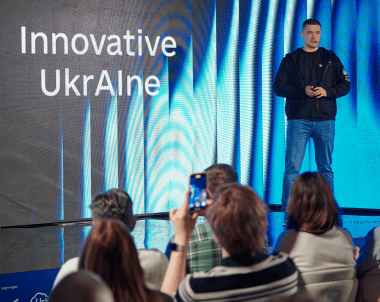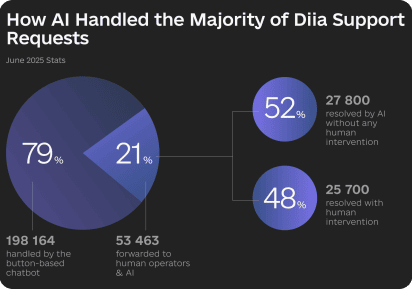- Direction:
- GovTech
How AI Now Handles 52% of Inquiries in Diia — and What Comes Next
- Authors
- Mykhailo Fedorov
- Publication date and time:
- Reading time:
- 6 min

How AI enables Diia to process tens of thousands of inquiries and stay connected with users 24/7 — a look into the internal AI tools powering our support team.
By Mykhailo Fedorov, First Deputy Prime Minister of Ukraine — Minister of Digital Transformation of Ukraine
As Ukraine transforms Diia into an AI-native platform, over half of all user inquiries are now resolved without human intervention — setting a new global standard for digital public services.
In the era of the AI revolution, government services must be as fast and intuitive as a conversation with artificial intelligence. This is the new baseline for meeting user expectations. AI has already reshaped consumer behavior — and the future of digital government lies in fast queries and instant results.
Back in 2019, we launched Diia — a revolutionary application that redefined how people interact with the state. Instead of visiting government offices, users access services via smartphone. No more lines — just a few clicks. But now we’ve entered the age of AI agents. If a service doesn’t feel like ChatGPT, Gemini, or similar models, users hesitate. Artificial intelligence has become the norm — and our response to the accelerating pace of change, the growing volume of data, and rising public expectations.
To deliver the best possible user experience, we’re transforming Diia into an AI-powered product. Our goal for this year is full AI integration across all processes. We’ve already deployed an AI assistant on the Diia portal that delivers a basic service. In parallel, we’re developing internal AI tools to optimize our support team’s workflow. Among them are:
- the Diia AI Consultant, which has been successfully piloted for over a month and handles user queries;
- and the Operator AI Assistant, which helps human agents generate replies faster and more accurately.

Use Case 1: AI Consultant for Diia Users
We launched the pilot of our AI Consultant in June. It’s an internal AI tool embedded in chatbot platforms like Telegram, Viber, and Facebook Messenger, where users ask questions about available services. The AI Consultant supports both the Diia app and web portal, already covering over 45 of the most frequently used services, which account for 65% of all support inquiries.
Say you need to request an OK-5 certificate — a document commonly used for confirming employment and salary history. You open the chatbot, go to Services → Duplicates, Certificates, Extracts → OK-5 Certificates, and type in your request — e.g., «How can I get the certificate?» The AI Consultant steps in and guides you through the process. You can ask about anything — from conscription-related services to online marriage applications.
The AI recognizes different services, retains context, and distinguishes between multiple topics in a single conversation. For example, if you ask about an ID card and then a vehicle re-registration, the AI treats them separately and helps resolve both. The model draws exclusively from internal business logic, product knowledge, and Diia’s tone of voice.
If the request is complex or unclear, the AI asks clarifying questions. If it still doesn’t understand, a human operator is involved. Meanwhile, a team of AI Trainers — former support agents with deep product knowledge — continuously improve the AI by training it to respond more accurately to similar future inquiries.

How the AI Works
We developed a dedicated architecture based on ChatGPT and integrated it with our internal CRM. Since ChatGPT doesn’t inherently understand how Diia’s services work, how to handle edge cases, or how to speak in Diia’s tone, we had to train it from scratch.
To do this, we assembled a team of AI Trainers from our existing support agents — experts who already knew the products inside out. Their mission: train the AI to respond with the same quality they deliver. Together with team leads and our prompt engineers, they documented business processes for each service, built structured knowledge bases, created tailored prompts, and trained the model to answer clearly and accurately. This work continues daily.
Each AI Trainer and prompt engineer pair is responsible for ensuring the AI can correctly handle 80% of all queries about their assigned product. To maintain quality, they monitor responses in real time, fine-tune prompts, update content, adjust phrasing, and teach the AI new nuances. Dashboards track response speed, quality, and user feedback — enabling rapid adjustments to increase resolution rates.
Importantly, no personal data is shared with or stored by the AI. All user queries are depersonalized before being processed. Yet, thanks to contextual understanding, the AI can still provide helpful, human-like responses.
In its first month, the AI Consultant independently resolved over 52% of requests that would previously have gone to a live operator — more than half of all inquiries.
Let’s break that down: In June, the support team received 251,627 requests. Of those, 198,164 were handled by the button-based chatbot. The remaining 53,463 were forwarded to either human operators or the AI. The AI successfully resolved 27,800 of them, without human intervention. Weekly stats are even stronger: 72% of inquiries during one 7-day period were handled by the AI instead of an operator.

The AI is always available — 24/7, including nights, weekends, peak load periods, and product launches. There are no «all agents are busy» scenarios anymore.
Users can also rate the AI’s responses. These evaluations are pulled into dashboards, helping AI Trainers quickly retrain the model if something goes wrong.

Use Case 2: Operator AI Assistant
Another tool we’ve developed is the Operator AI Assistant. Diia’s support team handles thousands of user requests daily. To streamline response times, we created an internal AI Assistant — and rolled it out even earlier than the AI Consultant to test model training, product recognition, answer quality, contextual accuracy, and hallucination control.
The result: a co-pilot that generates real-time drafts during live chats. Operators can send the AI-generated reply as is or edit it as needed. It’s like having a co-author who suggests phrasing, speeds up the workflow, and keeps the final decision in human hands.
Here’s how it works: A user sends a message. The operator selects the entire conversation or a specific message and clicks a button to query ChatGPT. The AI instantly generates a draft reply.
This assistant draws on Diia�’s internal knowledge base, mirrors its communication style, understands multiple topics within a single thread, and adapts to conversation history. It helps operators quickly resolve standard questions so they can focus on complex or sensitive issues — significantly increasing overall response speed.
In just a few weeks in May, support agents used the assistant 7,993 times — covering 16% of all operator-handled inquiries.

Will AI Replace the Support Team?
Our goal is to make support more efficient and more accessible to users — while also scaling the number of simultaneous conversations we can handle. AI is one of the key enablers. Since 80% of user requests involve typical questions already documented in our knowledge base, we’re automating those through AI — freeing human operators to handle more complex, unique scenarios.
This is not about replacing people. It’s about allowing our team to focus on the high-impact, high-empathy cases where experience and expertise matter most.
We’ve also made internal growth a priority this year — encouraging team members to take on new responsibilities and try new roles within the ministry.
In our support team, employees who deeply understand Diia’s products and want to grow are becoming prompt engineers and AI trainers. In fact, our entire AI training team is built from former support agents. Their task now is to scale their knowledge through the AI model. Many are also progressing into new roles — as team leads, PMs, QA engineers, or even developers. One such example: an agent moved from Level 1 support to QA and then to software developer.
In total, over 100 former support agents have advanced to new positions within the Diia ecosystem. It’s become an internal career elevator — both within the support team and across the broader ecosystem.
So, will AI replace support agents? Definitely not entirely. But we are automating the majority of routine processes — to shift human focus toward service development and improving user experience



